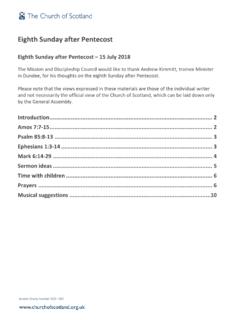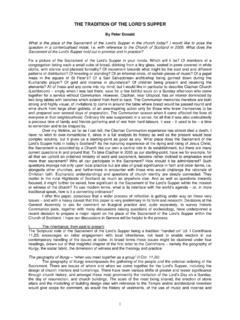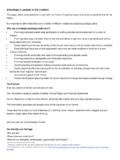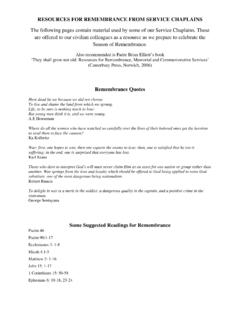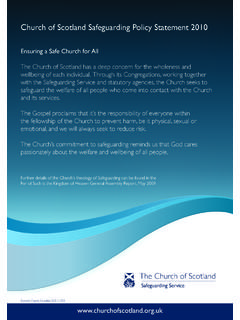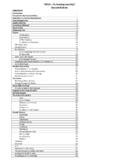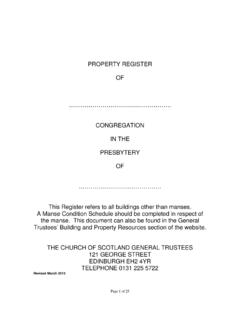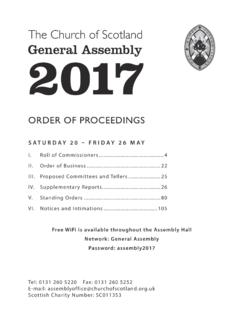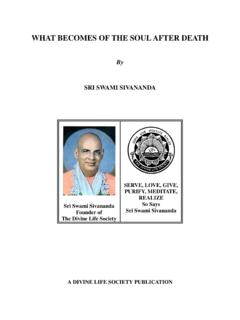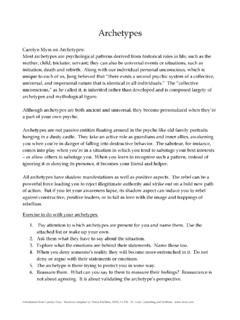Transcription of Fifth Sunday after Pentecost - churchofscotland.org.uk
1 Fifth Sunday after Pentecost Fifth Sunday after Pentecost 24 June 2018 The Mission and Discipleship Council would like to thank the Very Rev Dr Russell Barr, Minister of Edinburgh Cramond Church, for his thoughts on the Fifth Sunday after Pentecost . Please note that the views expressed in these materials are those of the individual writer and not necessarily the official view of the Church of Scotland, which can be laid down only by the General Assembly. Introduction .. 2 1 Samuel 17:1a, 32-49 .. 2 Psalm 107:1-3, 23-32 .. 3 2 Corinthians 6:1-13 .. 3 Mark 4:35-41 .. 4 Sermon ideas .. 5 Time with children .. 6 Prayers .. 6 Musical suggestions .. 10 Introduction The dramatic account of Jesus calming not only the storm but also the fears of his disciples is one that awakens an immediate and sympathetic response.
2 Given the many storms in which people can find themselves, and the fears these storms awaken, and given the environmental, political and social storms confronting us nationally and globally, the notes for this Sunday are going to concentrate on the Mark s gospel passage. In her commentary on the passage, Dawn Ottoni Wilhelm (Preaching the Gospel of Mark: Proclaiming the Power of God, Westminster John Knox Press, 2008) notes the incident occurred on the same day Jesus had been preaching and teaching. As the day ends, Wilhelm draws attention to the way the disciples have struggled to understand the full extent of Jesus authority and power over the wind and the waves just as much as they have struggled to understand the meaning of his parables.
3 Wilhelm also notes that the account of the storm at sea weaves together a number of the important theological themes in Mark s gospel. For example, in directing his disciples to go over to the other side , that is, from Jewish to Gentile territory, Mark s Jesus is someone who embodies God s care and concern for all people. As the narrative unfolds we are confronted with a Jesus who will not be constrained by human boundaries, categories and divisions. If the fearful response of the disciples resonates with the various other gospel passages where Jesus tells people not to be afraid, the closing question who is this then that even the wind and waves obey him?
4 Is central to Mark s gospel. 1 Samuel 17:1a, 32-49 The narrator has already told us that the the Spirit of the Lord departed from Saul and another confrontation with the Philistines provides a quick and clear illustration of what that meant. Although Saul now had his own army to confront the invading Philistines, an unexpected and frightening development threw Saul s battle plans into chaos. While single or representative combat is unfamiliar to today s armed forces, in ancient times warfare followed various codes of convention and ignoring or declining Goliath s challenge would have been utterly humiliating for Saul. The narrator is not concerned to ask why no Israelite soldier volunteered to challenge Goliath and focuses instead on the terrified Saul.
5 Rather he wants his readers to see how the practical loss of the Spirit of the Lord becomes evident as it leads to the loss of Saul s courage and leadership. Evidently God s presence and God s spirit were vital not just to Saul s well-being but to the nation s welfare. The account of David confronting Goliath is familiar and, beyond the account of the fall of Saul and the rise of David, it also introduces us to the shepherd boy who, faced with seemingly impossible odds, put his whole trust in the God of Israel and emerged victorious. David s faith stands in sharp contrast to the disciples who, in the grip of the storm, are rebuked for their lack of faith.
6 Psalm 107:1-3, 23-32 Biblical scholars suggest that as well as reprising some of the main themes from the previous two psalms, Psalm 107 begins a new section of the Psalter and probably comes from the post-exilic period when Israel had returned home following her long exile in Babylon. The Psalmist invites the worshippers to give thanks for the Lord s enduring goodness and love, made evident in the gathering together once again of the people who had been scattere d to the north, east, south and west. Had the gathering together and the journey home been easy? No, it had not and what follows are a series of word pictures in which the Psalmist describes some of the struggles people had endured in order to return home.
7 Among the returning exiles were those who had become merchants. The dangers they faced were different from those who crossed the desert. The Psalmist describes how God waited until they were frightened and at their wits end; it is then that they realise their need of God, and having cried to the Lord in their trouble, God hears their cry and rescues them from their distress. With the storm stilled and the sailors brought to a safe harbour, the passage ends with them going to the Temple to worship and praise God. The connection with the experience of the disciples in the gospel passage is obvious. 2 Corinthians 6:1-13 The theme of storm, struggle and hardship is continued in what is surely one of the most memorable passages in Paul s correspondence, as the Apostle gives us an insight into some of the troubles he has endured.
8 If Paul s main concern is to be an ambassador for Christ, it is clear the role is not without its challenges and far from a life of privilege and safety, Paul s journey of faith and life in the service of Christ has included considerable risk and difficulty. As well as the obvious hardships of shipwreck, imprisonment and flogging, Paul also describes the hard work, sleepless nights and hunger he has experienced and hints at the internal conflicts of doubt and sorrow, which are all part of the Christian life and experience. Although there were times when danger was his constant companion, and the prospect of death ever present, Paul s faith in the ultimate victory of God s goodness, purpose and love was never broken.
9 It might appear Paul had nothing and yet with his faith in Christ, Paul had everything that mattered to him in this world and the next. Mark 4:35-41 Chapter 4 begins with Jesus teaching a great crowd by the lakeside and such is the crush he commandeers a boat and addresses people as they gather at the water s edge. The boat which has served as Jesus platform during the day is now used to take him and his disciples to the other shore. Quite where they have been and where they end up is not made clear and Mark is content to report that their destination is the other side. A violent storm threatens their journey and the disciples fear the boat is about to be overwhelmed.
10 Jesus sleeping appears to the disciples to be a sign of his indifference to their fate (and it offers a sharp contrast to their failing to stay awake in the Garden of Gethsemane). Having awakened, Jesus rebukes the wind and the sea and does so in the same way that he will rebuke and drive out the demon in the following incident. As we have seen in the story of creation, the Exodus narrative, or in Psalm 107, divine power over the forces of nature is not new to Biblical tradition and the image of water as a source of chaos is repeated at several points. Indeed one of the most notable aspects of St John the Divine s great revelation of a new heaven and a new earth is that there will no longer be any sea.
